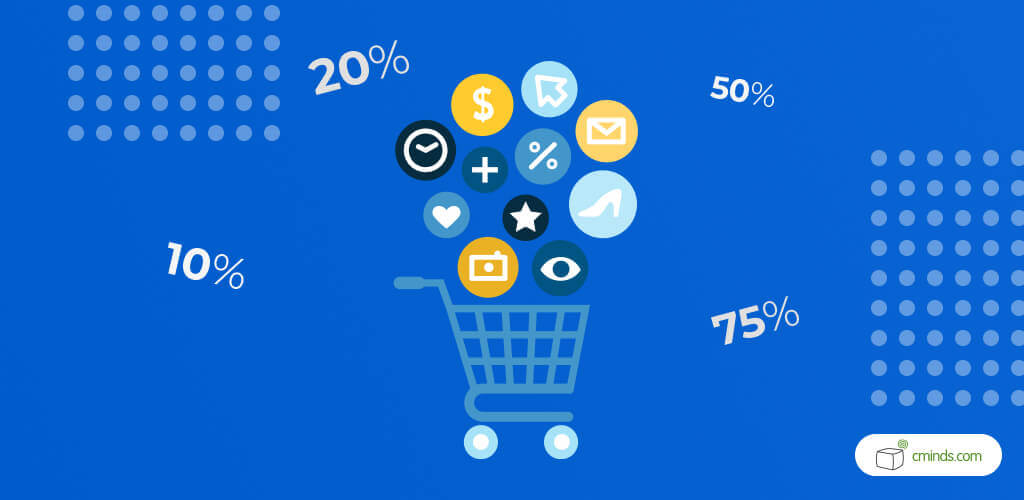When launching your eCommerce store, picking the right platform is essential. We believe Magento benefits eCommerce. So, why should you choose Magento?

Here CreativeMinds we believe that when you make such an important choice, it’s essential that you’re armed with all the facts. So, today we’re taking a look at some Magento benefits for both B2B and B2C sellers.
December 2024 Offer – For a Limited Time Only:
Get All Access Pass Package for Magento 2 for 25% off! Don’t miss out!
B2B and B2C: What’s the difference?

B2B and B2C are shorthand phrases for two different types of selling that takes place in the eCommerce sphere. So, what’s the difference here?
B2C
Short for Business to Consumer, this is likely what comes to mind when you think about online stores. B2C refers to the online selling of any product from a retailer directly to the consumer.
Customers browse products from listings on a website, specify a delivery method, and make their personal purchases at checkout via their preferred payment method.
B2B
B2B stands for Business to Business. This is where businesses sell to other businesses. Transactions are specifically between business buyers and business sellers. Purchases are made by company buyers who research and order products from B2B sellers to supply the business they represent.
The purchasing process is often more complicated than B2C. Orders are often placed through emails, uploaded documents, and other forms of electronic orders to accommodate high-volume purchases and company record keeping.
Enter Magento

Typically, B2C and B2B selling require vastly different business acumen and marketing techniques. After all, you’re not going to plan a business trip the same way you plan a romantic getaway for two.
The good news is, however, that Magento boasts features that are helpful for both B2B and B2C sellers. Read on for Magento benefits for both types of business.
Magento Benefits for B2C
The platform offers huge benefits for B2C sellers, with myriad functions to help you grow your customer base and ensure repeat business from individual consumers. These include:
Advanced personalization. Personalization is integral to an excellent B2C shopping experience, Magento offers so many tools to help with this.
Comprehensive discount and promotion tools. Who doesn’t love a discount? Magento provides tools that enable you to deliver the best deals and discounts to consumers.
Tools for scalability. The platform allows for easy scalability, meaning you can grow your eCommerce website with your business.
Easy product set-up. Magento makes it super easy to set up new product pages on your website. So, if you’re launching a new range or just want to add more products, it’s quick and easy.
Magento Benefits for B2B

Magento is a powerhouse for B2B sellers. No other platform boasts a business suite that is quite this impressive. Magento’s functionality for B2B includes:
Customer roles and responsibilities. Self-services tools to manager buyer roles and permissions.
Saved shopping lists. This makes repeat purchasing a breeze for businesses who need to make complex bulk orders from B2B sellers.
Quotation management. Magento offers a seamless request-for-quote process for easy online deal negotiations.
Customer specific catalogs and pricing. So that businesses can see products and pricing that reflects their contract with you.
Quick order forms and list uploads. Perfect for business customers who know exactly what they want and need.
Amazon channel management. Allows for full integration with Amazon, for seamless selling on the platform.
Magento Benefits for B2C and B2B

The benefits don’t just stop there, however. There are some that cross the increasingly blurry lines between B2C and B2B, adding benefit no matter the type of audience you’re targeting.
Mobile optimized sites. Mobile is the future of eCommerce and Magento makes it easy to optimize your website for mobile devices.
SEO credentials. EO is an important part of any eCommerce store. Magento comes with both architecture and customization options to boost SEO.
An unrivaled ecosystem. Magento’s longevity and solid community of developers means you’re never without help and guidance when you need it.
The Takeaway

Magento is a strong platform that can be used to support a diverse range of business models. Both B2C and B2B businesses will see the benefits of using Magento to build their eCommerce store.
There’s general plus points like its array of extensive and robust customization features; large network of developers; and in-built SEO tools. But, on a more micro level, there are a number of tools that make it an excellent choice for either B2C or B2B business models.


